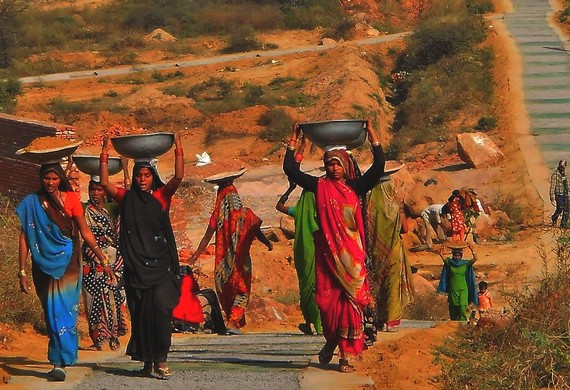
Deleterious Outcome of Lockdown - Higher Number of Women Left Jobless Compared to Men
By: WE STAFF | Monday, 14 September 2020
The pandemic-induced lockdowns and restrictions has impacted the livelihood of women in India. The impact is reflected in the responses of 3,221 women workers from the informal sector in a new survey report covering 20 states.
More women (79.23 percent of sample) were out of work post-lockdown compared to men, with 51.6 percent of the women also reporting no wages during the lockdown period. The informal workers’ survey steered by civil society organization, ActionAid Association was conducted between May-June covering 11,537 respondents of which 28 precent (3,221) were women.
Among domestic workers, the survey found that 85 percent lost their livelihoods after the lockdown. In the absence of wages, many of them had to reduce their consumption and rely on savings with almost all (99 percent) dipping into them. Almost 68 percent stated they had incurred debts in order to meet their expenses during the lockdown.
Over 88 percent domestic workers live in urban areas as against only 11.5 percent in rural areas. Also, 40 percent of them said they had migrated for work. On the whole, prior to the lockdown 90 percent of the women surveyed were working as compared to 85 percent of men. However, by mid-May, 79 percent women reported that they were unemployed compared to 75 percent of men. As many as 1,788 women workers revealed their exact occupation during the survey.
Specific challenges faced by 401 domestic workers and 409 agricultural workers, including weeding workers and farm labour, are highlighted in the report along with those of women beedi makers and waste workers. 52 percent of women workers reported that they had not received any wages as compared to 46 percent of men, implying that women workers were at a greater risk of wage penalty after the lockdown. 16 percent of men and women received partial wages after the lockdown, while 32 percent of female workers and 37 percent of male workers received full wages.
Though almost all domestic workers had an Aadhaar card, the survey found that enrolment of these workers in government schemes is quite low. Overall, 60 percent have ration cards. Their enrolment in other schemes was found to be negligible, only 10 percent were beneficiaries of the Ujjwala Yojana, and 19 percent under Jan Dhan Yojana. Notably, out of those who have Jan Dhan accounts, almost 79 percent reported having accessed the money provided under PM Garib Kalyan Yojana.
Most Viewed
- 1 Women's Health Startup HerMD Closing Doors Amid Industry Challenges
- 2 5 Famous Women in Indian Armed Forces
- 3 Saudi Women No longer Require Male Permission for Clothing Choices, says Prince MbS
- 4 Kolkata Medtech Startup Innovodigm Raises Rs 5.5 Crore Seed Funding Led by IAN Group
- 5 Yamunanagar's Kashish Kalra Honoured after Securing 111th Rank in UPSC Civil Services Exam
- 6 Madurai Appoints Its First Woman Corporation Head
- 7 IAS Vijayalakshmi Bidari Appointed as the new Nagpur Divisional Commissioner
- 8 American Entrepreneur Lucy Guo Overtakes T Swift to become Youngest Female Billionaire
- 9 ICC Women's World Cup 2025 Trophy Showcased at Indore's Holkar Stadium
- 10 Aparna Saxena's Beauty Venture AntiNorm Launches in India
- 11 Vidya Nataraj Co-Founded BlueStone Jewellery & Lifestyle files IPO
- 12 5 Women Freedom Fighters of India
- 13 Dr. G Krishnapriya appointed as CEO for Trichy
- 14 M3M & Sirona Partner to Introduce Menstrual Hygiene Vending Machines in 15 Locations
- 15 Punjab Govt launches SHE Cohort 3.0 Supporting Tech-led Women Startups
- 16 Indian origin Lawyer, Sweena Pannu appointed as the US New Superior Court Judge
- 17 The Aurora Tech Award recognizes 4 Indian Women-led Startups
- 18 Kerala's Republic Day parade featured an all-female tableau
- 19 Manisha Kabbur Becomes Karnataka's First Woman International Karate Coach
- 20 Director K. S. Ravikumar's Daughter Maalica Ravikumar Launches Life Coaching Company 'Evergrowth Academy' for Women
- 21 Leezu's Raises Pre-Seed Funding to Accelerate Growth in Sexual Wellness Industry
- 22 Sattu: Super-easy summer drink for PCOS gut healing
- 23 Swathi Nelabhatla creates Sitha App, India's First Women-Exclusive Gig Platform
- 24 7 Timeless Female Kathak Dancers & their Iconic Legacies
- 25 Meet 7 Iconic Women Architects of Modern India & their Most Impactful Work
- 26 This Woman-led Insuretech Startup is Helping Bridge the Education Financing Gap in India
- 27 Women Leaders Share Lessons Learnt from India Women's WC Win
- 28 5 Enterprising Women Founders Powering Singapore's Tech & Innovation Landscape
- 29 4 Women. 4 Stories. One Vision for Smarter, Stronger Healthcare
- 30 Global Gender Gap Narrows to 68.8%, But Full Equality 123 Years Away: WEF Report 2025
- 31 Changemakers: 7 Women Entrepreneurs Taking the Make in India Movement Forward
- 32 Meet Lucy Guo, The Youngest Self-Made Female Billionaire Disrupting Tech
- 33 How Women are Driving India's Festive Online Shopping Surge






